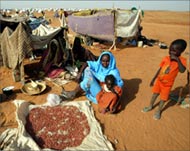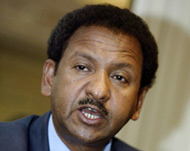US ready to alter UN Sudan resolution
The United States is willing to make changes to its draft resolution on Sudan, US Deputy Secretary of State Richard Armitage has said.

But Washington insists on having “as strong a resolution as possible”, he stressed during a visit on Monday to Oslo.
“Generally, as we move through the UN Security Council process with a resolution, whether we put in the resolution or another country, there are modifications and I do expect some modifications,” he said.
The US formally presented a draft resolution to the Security Council on Thursday, pressing the Sudanese government to rein in rebel groups accused of being primarily responsible for the bloodshed in Darfur, where an estimated 50,000 people have died in 19 months of warfare.
The resolution is the second proposed since July, intended to stop the violence which has also forced about 1.4 million people to flee their homes.
Objection
China has led a number of nations that object to the draft, which calls for a beefed-up African Union (AU) force in Darfur and threatens sanctions on Sudan’s oil industry if Khartoum does not disarm and stop the rebels.
 |
|
Darfur violence forced about 1.4 |
The US has said the killing amounts to “genocide” – a claim rejected by the Sudanese government – and included in the draft a call for an international commission of inquiry into the deaths.
Washington has solid support from Germany and Britain, and needs nine votes to pass the resolution if no permanent council member exercises its veto.
But Russia and China, which both have veto rights, as well as
Pakistan and Algeria, have expressed unhappiness with the draft.
“We want as strong a resolution as possible, obviously. But the resolution won’t be as strong as the draft,” Armitage said following his talks with Norwegian Foreign Minister Jan Petersen.
The Security Council is expected to make a decision this week.
Optimism
Sudan’s foreign minister said on Monday he was optimistic about striking a peace deal within three months to end atrocities in Darfur, and again rejected US charges of genocide in the region.
 |
|
Ismail is hopeful his country will |
Mustafa Usman Ismail, on a visit to South Korea, said his government and rebel groups would “very soon” resume the AU-brokered peace talks.
“Hopefully, before the end of this year, we will sign a final peace agreement,” he said.
“Hopefully, by next year, the whole of Sudan will be in peace.”
In the Nigerian capital of Abuja, rebel negotiators also said on Sunday they remained hopeful about peace talks as AU special envoy General Abdu Salami Abu Bakar of Nigeria was helping bridge the gap.
The minister said the US-led resolution would fail to win backing from the UN Security Council. “It will be very difficult for the United States to impose sanctions on Sudan because it is unrealistic, not balanced and not rational,” he said.
Rights group’s visit
In a separate development, a high-level team from the human rights group Amnesty International was set to depart London on Monday to visit Darfur, a spokeswomen said.
|
“This is only the second time in 13 years that Amnesty International has been granted access to Darfur” Samantha Maurin, |
It will be the first mission to the region since the conflict broke out in early 2003.
“This is only the second time in 13 years that Amnesty International has been granted access to Darfur,” spokeswoman Samantha Maurin said.
Amnesty had been trying to get permission to visit for the last six months, she said, but could offer no explanation about why it had taken so long.
Maurin said the team, which will include group secretary general Irene Khan, had not been given any specific restrictions by Sudanese authorities, but said: “They may restrict the time we get to spend in certain places. We may only get to spend half an hour in certain camps.”